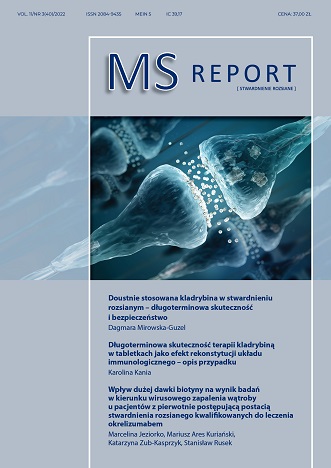Oral cladribine in multiple sclerosis – long-term efficacy and drug safety Review article
Main Article Content
Abstract
Oral cladribine was registered by the European Medicines Agency in 2017 for the treatment of a highly active relapsing form of multiple sclerosis, confirmed by clinical signs or the results of imaging diagnostics carried out by magnetic resonance imaging. According to the registration, the drug is used for 2 years in a strictly defined scheme that does not require repeated doses in the 3rd and 4th year of therapy. At the same time, taking into account the long-term duration of the disease and data from routine practice, we know that in some groups of patients there is a need to repeat cladribine administration. The article points to different response patterns to cladribine therapy, discusses the factors that may determine the long-term effectiveness and safety of this drug, and presents current knowledge about the long-term effects of its use and new reports in the field of pharmacovigilance.
Article Details
Copyright © by Medical Education. All rights reserved.
References
2. Programy lekowe w chorobach nieonkologicznych (Leczenie chorych na stwardnienie rozsiane (B29) (access: 10.11.2022).
3. Mavenclad® – charakterystyka produktu leczniczego (access: 10.11.2022).
4. Leis TP, Weissert R. Cladribine: mode of action and implications for treatment of multiple sclerosis. Clin Neuropharmacol. 2011; 34: 28-35.
5. Ceronie B, Jacobs BM, Baker D et al. Cladribine treatment of multiple sclerosis is associated with depletion of memory B cells. J Neurol. 2018; 265(5): 1199-209. http://doi.org/10.1007/s00415-018-8830-y.
6. Baker D, Herrod SS, Alvarez-Gonzalez C et al. Both cladribine and alemtuzumab may effect MS via B-cell depletion. Neurol Neuroimmunol Neuroinflamm. 2017; 4: e360.
7. Hermann R, Karlsson MO, Novakovic AM et al. The clinical pharmacology of cladribine tablets for the treatment of relapsing-remitting multiple sclerosis. Clin Pharmacokinet. 2019; 58(3): 283-97.
8. Moreau T, Coles A, Wing M et al. Transient increase in symptoms associated with cytokine release in patients with multiple sclerosis. Brain. 1996; 119: 225-37.
9. Cohen JA, Coles AJ, Arnold DL et al. Alemtuzumab versus interferon-beta-1a as first line treatment for patients. Lancet. 2012; 380: 1819-28.
10. Hauser SL, Bar-Or A, Comi G et al. Ocrelizumab versus interferon-beta-1a in relapsing-remitting multiple sclerosis. N Engl J Med. 2017; 376: 221-34.
11. Rolfes L, Pfeuffer S, Hauntemann N et al. Immunological consequences of cladribine treatment in multiple sclerosis: a real-world study. Mult Scler Relat Dis. 2022; 64: 103931.
12. Baker D, Pryce G, Herrod SS et al. Potential mechanism of action related to the efficacy and safety of cladribine. Mult Scler Relat Disord. 2019; 30: 176-86.
13. Comi G, Cook SD, Rammohan P et al. Long-term effects of cladribine tablets on MRI activity outcomes in patients with relapsing-remitting multiple sclerosis. The CLARITY extension study. Ther Adv Neurol Disord. 2018; 11: 1756285617753365.
14. Giovannoni G, Sorensen SP, Cook S et al. Safety and efficacy of cladribine tablets in patients with relapsing-remitting multiple sclerosis: results from the randomized extension trial of the CLARITY study. Mult Scler. 2018; 24: 1594-604.
15. Giovannoni G, Comi G, Rammohan K et al. Long-term disease stability assessed by the expanded disability status scale in patients treated with cladribine tablets 3,5 mg/kg for relapsing multiple sclerosis: an exploratory post hoc analysis of the CLARITY and CLARITY extension studies. Adv Ther. 2021; 38: 4975-85.
16. Giovannoni G, Singer BA, Issard D et al. Durability of no evidence disease activity-3 (NEDA-3 in patients receiving cladribine tablets: the CLARITY extension study. Mult Scler J. 2021. http://doi.org/10.1177/13524585211049392.
17. Patti F, Visconti A, Capacchione A et al; CLARINET-MS Study Group. Long-term effectiveness in patients previously treated with cladribine tablets: a real-world analysis of the Italian multiple sclerosis registry (CLARINET-MS). Ther Adv Neurol Disord. 2020; 13: 1756286420922685.
18. Meuth SG, Bayas A, Kallmann B et al. Long-term management of multiple sclerosis patients treated with cladribine tablets: an expert opinion. Exp Opin Pharmacother. 2020; 21(16): 1965-9.
19. Meuth SG, Bayas A, Kallmann B et al. Long-term management of multiple sclerosis patients treated with cladribine tablets beyond year 4. Exp Opin Pharmacother. 2022. http://doi.org/10.1080/14656566.2022.2106783.
20. Meca-Lallana V, Dominiguez Garcia JM, Lopez Riuz R et al. Expert-agreed practical recommendation on the use of cladribine. Neurol Ther. 2022; 11(4): 1475-88. http://doi.org/10.1007/s40120-022-00394-0.
21. Petracca M, Ruggieri S, Barbuti E et al. Predictors of cladribine effectiveness and safety in multiple sclerosis: a real-world, multicenter, 2-year follow-up study. Neurol Ther. 2022; 11(3): 1193-208. http://doi.org/10.1007/s40120-022-00364-6.
22. Giovannoni G, Sorensen SP, Cook S et al. Efficacy of Cladribine Tablets in high disease activity subgroups of patients with relapsing multiple sclerosis: A post hoc analysis of the CLARITY study. Mult Scler. 2019; 25(6): 819-27.
23. Giovannoni G, Sorensen SP, Cook S et al. Safety and efficacy of cladribine tablets in patients with relapsing-remitting multiple sclerosis: results from the randomized extension trial of the CLARITY study. Mult Scler. 2018; 24: 1594-604.
24. Zanghi A, Gallo A, Avolio C et al. Exit strategies in natalizumab-treated RRMS at high risk of progressive multifocal leukoencephalopathy: a multicenter comparison study. Neurotherapeutics. 2021; 18: 1166-74.
25. Pfeuffer S, Rolfes L, Hackert J et al. Effectiveness and safety of cladribine in MS: real-world experience from two tertiary centres. Mult Scler. 2022; 28: 257-68. http://doi.org/10.1177/13524585211012227.
26. Freeman L, Longbrake EE, Coyle PK et al. High-efficacy therapies for treatment-naïve individuals with relapsing-remitting multiple sclerosis. CNS Drugs. 2022; 36: 1285-99. http://doi.org/10.1177/s40263-022-00965-7.
27. Pakpoor J, Disanto G, Altmann DR et al. No evidence for higher risk of cancer in patients with multiple sclerosis taking cladribine. Neurol Neuroimmunol Neuroinflamm. 2015; 2: e158.
28. Leist T, Cook S, Comi G et al. Long-term safety data from cladribine tablets clinical development program in multiple sclerosis. Mult Scler Relat Disord. 2020; 46: 102572.
29. Komunikat do fachowych pracowników ochrony zdrowia dotyczący ryzyka uszkodzenia wątroby u chorych leczonych kladrybiną (access: 10.11.2022).
30. Rolfes L, Pfeuffer S, Hackert J et al. Skin reactions in patients with multiple sclerosis receiving cladribine treatment. Neurol Neuroimmunol Neuroinflamm. 2021; 8(3): e990. http://doi.org/10.1212/NXL0000000000000990.

